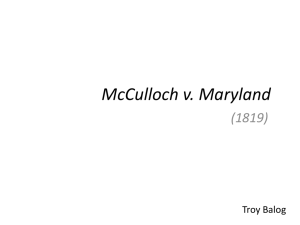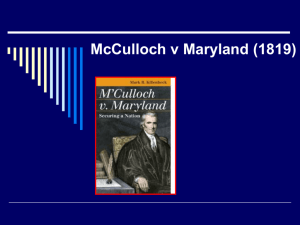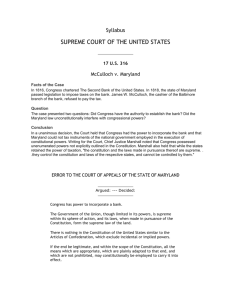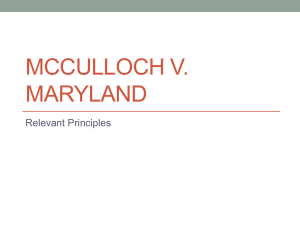McCulloch V. Maryland SC Decision Summary
advertisement
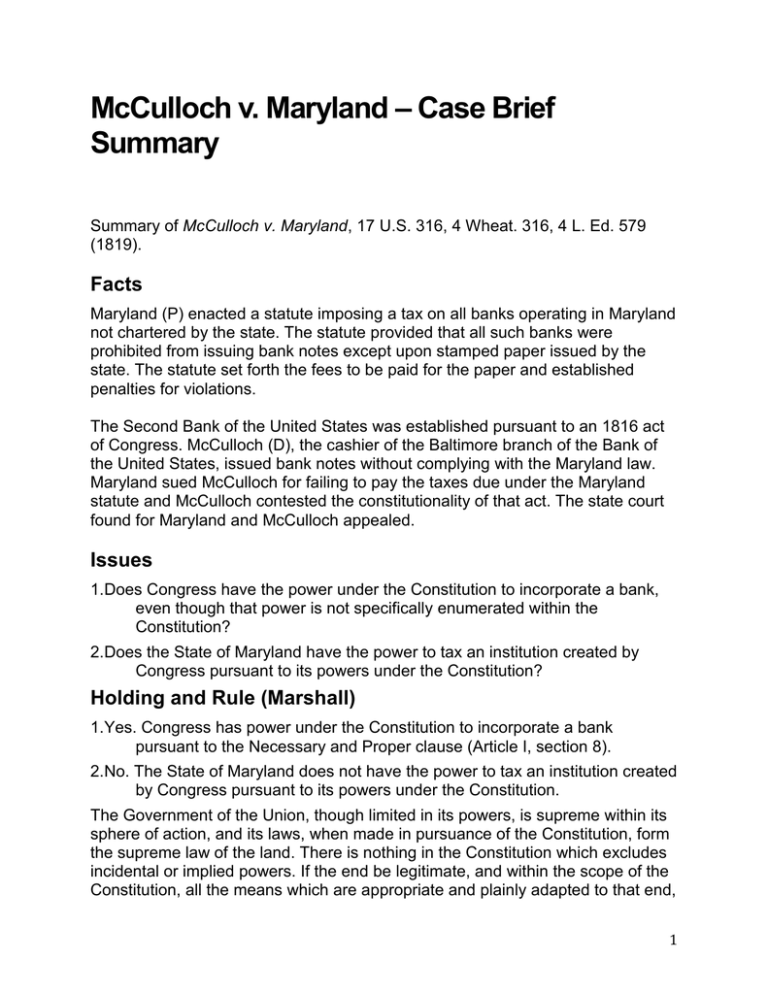
McCulloch v. Maryland – Case Brief Summary Summary of McCulloch v. Maryland, 17 U.S. 316, 4 Wheat. 316, 4 L. Ed. 579 (1819). Facts Maryland (P) enacted a statute imposing a tax on all banks operating in Maryland not chartered by the state. The statute provided that all such banks were prohibited from issuing bank notes except upon stamped paper issued by the state. The statute set forth the fees to be paid for the paper and established penalties for violations. The Second Bank of the United States was established pursuant to an 1816 act of Congress. McCulloch (D), the cashier of the Baltimore branch of the Bank of the United States, issued bank notes without complying with the Maryland law. Maryland sued McCulloch for failing to pay the taxes due under the Maryland statute and McCulloch contested the constitutionality of that act. The state court found for Maryland and McCulloch appealed. Issues 1.Does Congress have the power under the Constitution to incorporate a bank, even though that power is not specifically enumerated within the Constitution? 2.Does the State of Maryland have the power to tax an institution created by Congress pursuant to its powers under the Constitution? Holding and Rule (Marshall) 1.Yes. Congress has power under the Constitution to incorporate a bank pursuant to the Necessary and Proper clause (Article I, section 8). 2.No. The State of Maryland does not have the power to tax an institution created by Congress pursuant to its powers under the Constitution. The Government of the Union, though limited in its powers, is supreme within its sphere of action, and its laws, when made in pursuance of the Constitution, form the supreme law of the land. There is nothing in the Constitution which excludes incidental or implied powers. If the end be legitimate, and within the scope of the Constitution, all the means which are appropriate and plainly adapted to that end, 1 and which are not prohibited, may be employed to carry it into effect pursuant to the Necessary and Proper clause. The power of establishing a corporation is not a distinct sovereign power or end of Government, but only the means of carrying into effect other powers which are sovereign. It may be exercised whenever it becomes an appropriate means of exercising any of the powers granted to the federal government under the U.S. Constitution. If a certain means to carry into effect of any of the powers expressly given by the Constitution to the Government of the Union be an appropriate measure, not prohibited by the Constitution, the degree of its necessity is a question of legislative discretion, not of judicial cognizance. The Bank of the United States has a right to establish its branches within any state. The States have no power, by taxation or otherwise, to impede or in any manner control any of the constitutional means employed by the U.S. government to execute its powers under the Constitution. This principle does not extend to property taxes on the property of the Bank of the United States, nor to taxes on the proprietary interest which the citizens of that State may hold in this institution, in common with other property of the same description throughout the State. McCulloch v. Maryland (1819) In the landmark Supreme Court case McCulloch v. Maryland, Chief Justice John Marshall handed down one of his most important decisions regarding the expansion of Federal power. This case involved the power of Congress to charter a bank, which sparked the even broader issue of the division of powers between state and the Federal Government. In 1816 Congress established the Second National Bank to help control the amount of unregulated currency issued by state banks. Many states questioned the constitutionality of the national bank, and Maryland set a precedent by requiring taxes on all banks not chartered by the state. In 1818 the State of Maryland approved legislation to impose taxes on the Second National Bank chartered by Congress. James W. McCulloch, a Federal cashier at the Baltimore branch of the U.S. bank, refused to pay the taxes imposed by the state. Maryland filed a suit against McCulloch in an effort to collect the taxes. The Supreme Court, however, decided that the chartering of a bank was an implied power of the Constitution, under the “elastic clause,” which granted Congress the authority to “make all laws which 2 shall be necessary and proper for carrying into execution” the work of the Federal Government. This case presented a major issue that challenged the Constitution: Does the Federal Government hold sovereign power over states? The proceedings posed two questions: Does the Constitution give Congress power to create a bank? And could individual states ban or tax the bank? The court decided that the Federal Government had the right and power to set up a Federal bank and that states did not have the power to tax the Federal Government. Marshall ruled in favor of the Federal Government and concluded, “the power to tax involves the power to destroy." McCulloch v. Maryland (1819) In McCulloch v. Maryland (1819) the Supreme Court ruled that Congress had implied powers under the Necessary and Proper Clause of Article I, Section 8 of the Constitution to create the Second Bank of the United States and that the state of Maryland lacked the power to tax the Bank. Arguably Chief Justice John Marshall's finest opinion, McCulloch not only gave Congress broad discretionary power to implement the enumerated powers, but also repudiated, in ringing language, the radical states' rights arguments presented by counsel for Maryland. At issue in the case was the constitutionality of the act of Congress chartering the Second Bank of the United States (BUS) in 1816. Although the Bank was controlled by private stockholders, it was the depository of federal funds. In addition, it had the authority to issue notes that, along with the notes of states' banks, circulated as legal tender. In return for its privileged position, the Bank agreed to loan the federal government money in lieu of taxes. State banks looked on the BUS as a competitor and resented its privileged position. When state banks began to fail in the depression of 1818, they blamed their troubles on the Bank. One such state was Maryland, which imposed a hefty tax on "any bank not chartered within the state." The Bank of the United States was the only bank not chartered within the state. When the Bank's Baltimore branch refused to pay the tax, Maryland sued James McCulloch, cashier of the branch, for collection of the debt. McCulloch responded that the tax was unconstitutional. A state court ruled for Maryland, and the court of appeals affirmed. McCulloch appealed to the U.S. Supreme Court, which reviewed the case in 1819. In a unanimous opinion written by Chief Justice Marshall, the Court ruled that the Bank of the United States was constitutional and that the Maryland tax was unconstitutional. Concerning the power of Congress to charter a bank, the Court turned to the Necessary and Proper Clause of Article I, Section 8, which expressly 3 grants Congress the power to pass laws "necessary and proper" for the execution of its "enumerated powers." The enumerated powers of Congress include the power to regulate interstate commerce, collect taxes, and borrow money. Said the Court famously, "let the ends be legitimate, let it be within the scope of the constitution, and all means which are appropriate, which are plainly adopted to that end, which are not prohibited, but consist with the letter and spirit of the constitution, are constitutional." In other words, because the creation of the Bank was appropriately related to Congress's legitimate power to tax, borrow, and regulate interstate commerce, the Bank was constitutional under the Necessary and Proper Clause. Second, the Court ruled that Maryland lacked the power to tax the Bank because, pursuant to the Supremacy Clause of Article VI of the Constitution, the laws of the United States trump conflicting state laws. As Marshall put it, "the government of the Union, though limited in its powers, is supreme within its sphere of action, and its laws, when made in pursuance of the constitution, form the supreme law of the land." Because "the power to tax is the power to destroy," Maryland was unconstitutionally undermining the superior laws and institutions of the United States. Finally, the Court held that the "sovereignty" (political authority) of the Union lies with the people of the United States, not with the individual states that comprise it. The United States, not a simple alliance of states, is a nation of "constitutional sovereignty" with its authority resting exclusively with "the people" who created and are governed by the Constitution. To the Court, "the government of the Union is a government of the people; it emanates from them; its powers are granted by them; and are to be exercised directly on them, and for their benefit." Maryland's tax, however, violated constitutional sovereignty because it acted as a levy against all the people in the United States by a state accountable to only some of the people. If Marbury v. Madison (1803) "promised" that the Supreme Court would exercise great authority in shaping the laws of the land, McCulloch v. Maryland fulfilled that promise for the first time. Arguably no other decision has so profoundly defined national power. In one case, the Court expanded Congress' powers to include those implied by the Constitution, established the inferior status of the states in relation to the Union, and set the constitutional sovereignty of the federal government. McCulloch remains today a fundamental and binding bedrock of American constitutional law. 4
